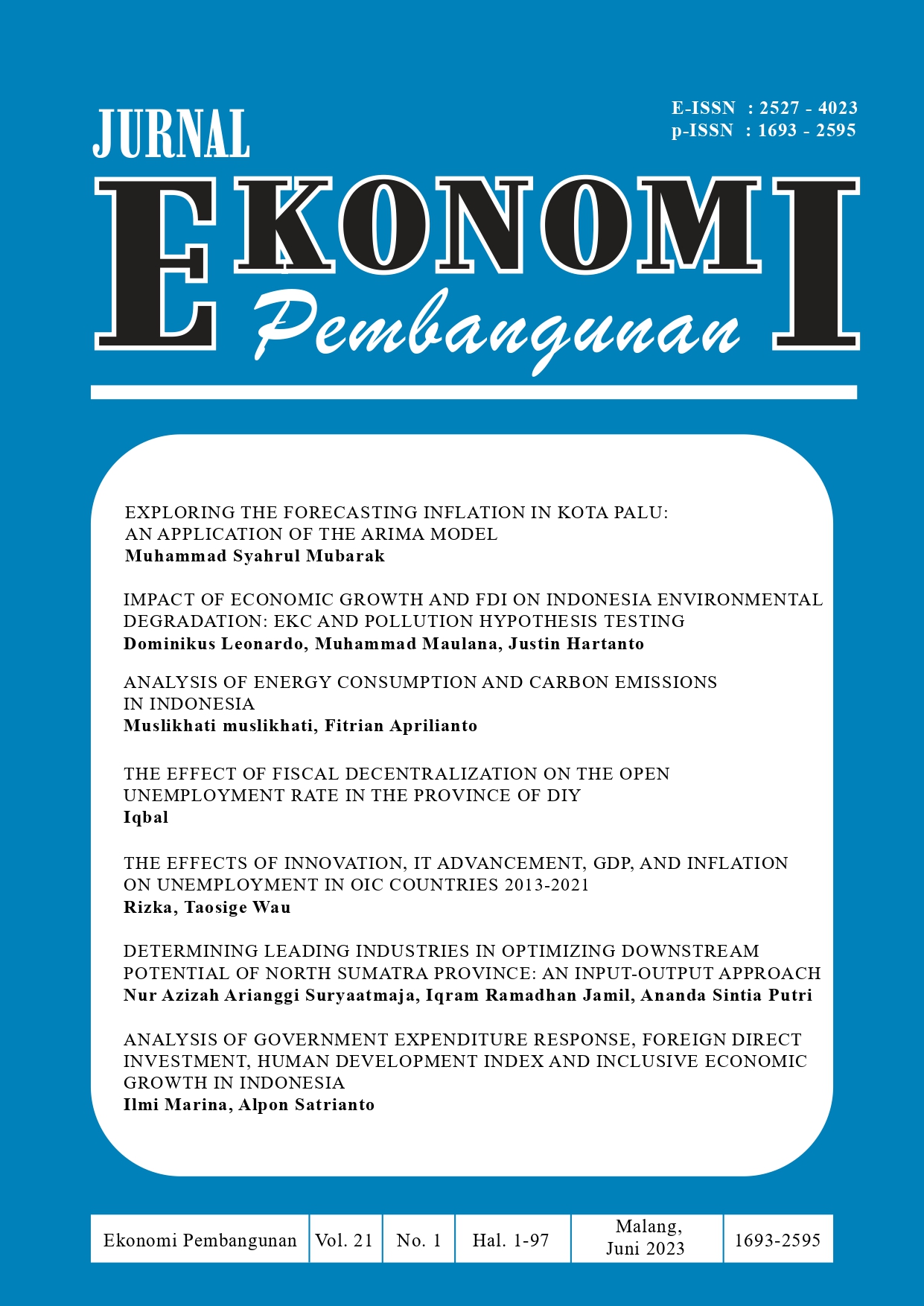Exploring The Forecasting Inflation in Kota Palu: An Application of the ARIMA Model
DOI:
https://doi.org/10.22219/jep.v21i01.25919Keywords:
Consumer Price Index, inflation, ARIMAAbstract
Inflation is an economic phenomenon that significantly impacts financial stability and the welfare of society. The movement of inflation in Kota Palu is challenging to explain using economic theories, as there are factors that are difficult to incorporate into models, such as the COVID-19 pandemic throughout 2020 to 2022, which impacted transportation, housing, and other services components. However, accurately predicting inflation rates remains a complex challenge. The objective of this study is to forecast the inflation movement for the year 2023. The data used in this analysis is the Consumer Price Index (CPI) of Kota Palu from January 2017 to March 2023, with 74 observations. ARIMA model with an Autoregressive (AR) model with lags six and nine was employed. The results of this study show that for the forecasted CPI or inflation from April 2023 to December 2023, the predicted CPI and inflation values closely approximate the actual CPI and inflation values. Therefore, the analysis can be considered accurate in predicting inflation movements.
Downloads
References
Baciu, I.-C. (2015). Stochastic models for forecasting inflation rate. Empirical Evidence from Romania. Procedia Economics and Finance, 44-52.
Badan Pusat Statistik (2019). Perkembangan Indeks Harga Konsumen/Inflasi 2018. Palu: Badan Pusat Statistik Provinsi Sulawesi Tengah.
Badan Pusat Statistik (2020). Perkembangan Indeks Harga Konsumen/Inflasi 2019. Palu: Badan Pusat Statistik Provinsi Sulawesi Tengah.
Badan Pusat Statistik (2022). Perkembangan Indeks Harga Konsumen/Inflasi 2021. Palu: Badan Pusat Statistik Provinsi Sulawesi Tengah.
Badan Pusat Statistik (2023). Perkembangan Indeks Harga Konsumen/Inflasi 2022. Palu: Badan Pusat Statistik Provinsi Sulawesi Tengah.
Dian Pratiwi, M. I. (2014). Pengujian Efek Fisher: Pengaruh Ekspektasi Inflasi Dan Kegiatan Ekonomi Terhadap Tingkat Bunga Nominal Di Indonesia. Ekomaks, 21-27.
Djirimu, M. A., & Tombolotutu, A. D. (2021). Catatan Kritis Atas Kinerja Pembangunan Ekonomi Provinsi Sulawesi Tengah Periode 2009-2019. Yogyakarta: Penerbit DEEPUBLISH.
Ghozali, I., & Ratmono, D. (2017). Analisis Multivariat dan Ekonometrika. Semarang: Badan Penerbit - Undip.
Gujarati, D. N., & Porter, D. C. (2012). Dasar-dasar Ekonometrika Edisi 5 Basic Econometrics. Jakarta: Salemba Empat.
Hasyim, A. I. (2017). Ekonomi Makro. Indonesia: Prenada Media.
Juhro, S. M., & Lyke, B. N. (2019). Forecasting Indonesia Inflation Within An Inflation-Targeting Framework: Do Large-Scale Models Pay Off? Bulletin of Monetary Economics dan Banking, 423-436.
Marpaung, G. N., Soesilowati, E., Rahman, Y. A., Tegar, Y. D., & Yuliani, R. (2022). Forecasting the Inflation Rate in Central Java Using ARIMA Model. Indonesian Journal of Development Economics, 163-173.
McKnight, S., Mihailov, A., & Rumler, F. (2020). Inflation forecasting using the New Keynesian Phillips Curve with a time-varying trend. Economic Modelling, 383-393.
Mihalache, R.-P., & Bodislav, D. A. (2023). Forecasting the Romanian Inflation Rate: An Autoregressive Integrated Moving-Average (ARIMA) approach. Theoretical and Applied Economics, 67-76.
Monica, M., Suharsono, A., & Ampa, A. T. (2022). Malang City Inflation Forecasting Using Autoregressive Integrated Moving Average Exogenous with Calendar Variation Effect. Al-Khwarizmi: Jurnal Pendidikan Matematika dan Ilmu Pengetahuan Alam, 149-162.
Radiansyah, R., Meygautama, H., Junianto, D., Rai, G. N., Octavera, A. D., & Suranto. (2023). Kebijakan Fiskal Regional Tahunan 2022 Provinsi Sulawesi Tengah. Sulawesi Tengah: Kantor Wilayah DJPb Provinsi Sulawesi Tengah.
Shumway, R. H., & Stoffer, D. S. (2017). Time Series Analysis and Its Applications: With R Examples. Jerman: Springer International Publishing.
Widarjono, A. (2009). Ekonometrika: Pengantar dan Aplikasinya. Yogyakarta: Ekonisia, Fakultas Ekonomi, UII.
Downloads
Published
Issue
Section
License
Copyright (c) 2023 Muhammad Syahrul Mubarak

This work is licensed under a Creative Commons Attribution-NonCommercial-ShareAlike 4.0 International License.
Authors who publish with Jurnal Ekonomi Pembangunan (JEP) agree to the following terms:
- For all articles published in Jurnal Ekonomi Pembangunan (JEP), copyright is retained by the authors. Authors permit the publisher to announce the work with conditions. When the manuscript is accepted for publication, the authors agree to the publishing right's automatic transfer to the publisher.
- Authors retain copyright and grant the journal right of first publication with the work simultaneously licensed under a Creative Commons Attribution-NonCommercial-ShareAlike 4.0 International License that allows others to share the work with an acknowledgment of the work's authorship and initial publication in this journal.
- Authors can enter into separate, additional contractual arrangements for the non-exclusive distribution of the journal's published version of the work (e.g., post it to an institutional repository or publish it in a book), with an acknowledgment of its initial publication in this journal.
- Authors are permitted and encouraged to post their work online (e.g., in institutional repositories or on their website) before and during the submission process, as it can lead to productive exchanges and earlier and greater citation of published work (See The Effect of Open Access).

This work is licensed under a Creative Commons Attribution-NonCommercial-ShareAlike 4.0 International License.






















